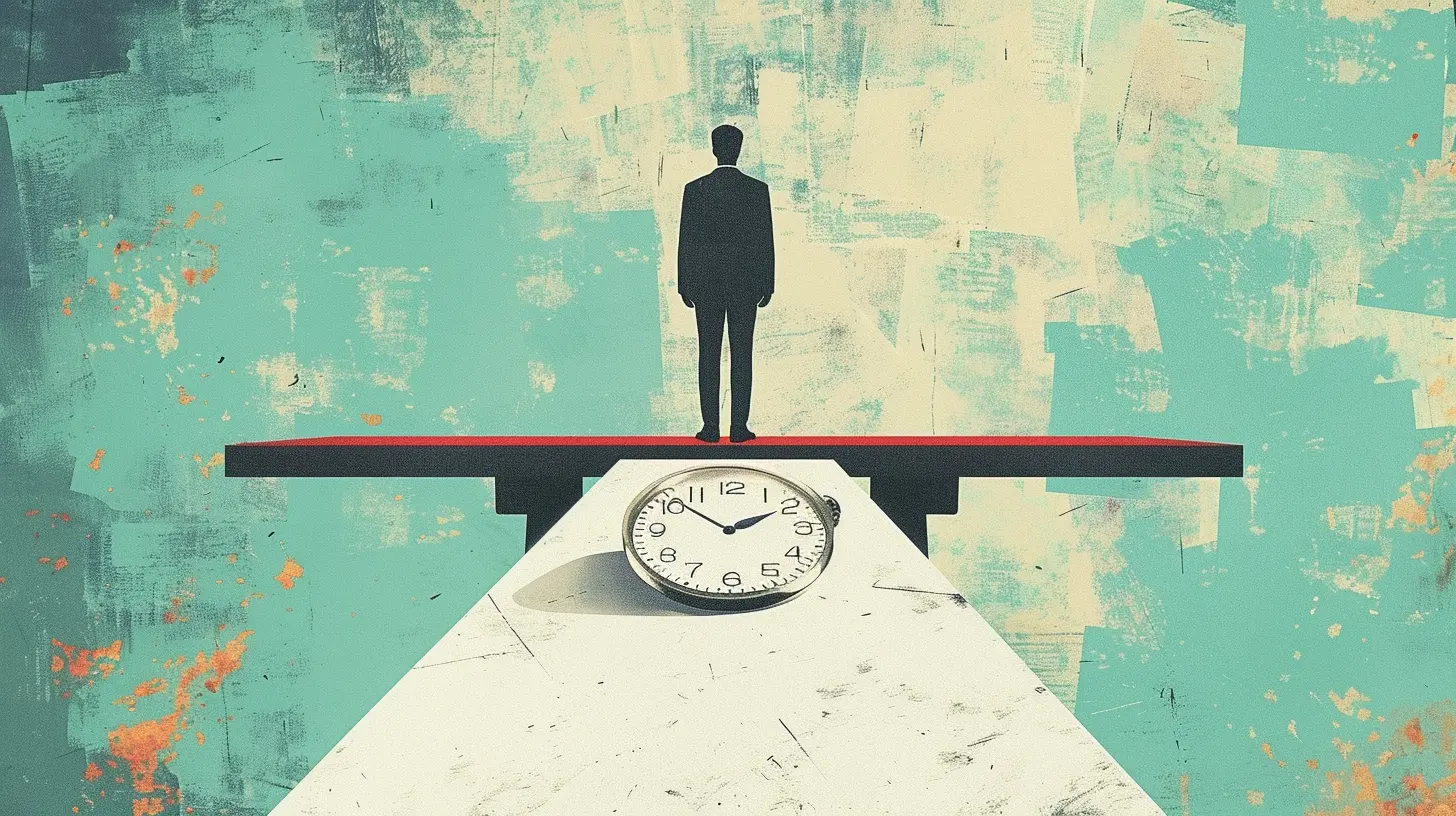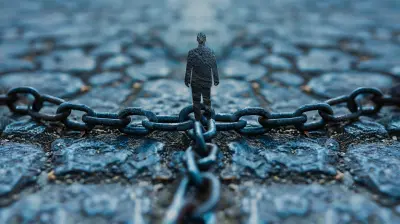Work-Life Balance: The Key to Preventing Burnout
18 October 2025
In today’s fast-paced world, striking a balance between work and personal life can feel like a tightrope walk. We’re expected to give our all at work, but we also crave time for ourselves, our families, and hobbies. But when we fail to find that balance, the result is often burnout — a state of emotional, physical, and mental exhaustion caused by prolonged stress.
So, how do we avoid falling into the burnout trap? The secret lies in mastering the art of work-life balance. In this article, we're going to dive deep into what work-life balance really means and why it's so crucial in preventing burnout. Whether you’re a workaholic who’s glued to your laptop or someone who struggles to switch off after hours, this guide is for you.

What is Work-Life Balance?
Let’s start with a basic question: What is work-life balance?Work-life balance is about creating harmony between your professional responsibilities and your personal life. It’s not about splitting your time equally between work and leisure, but rather about finding a healthy equilibrium where neither aspect dominates your life.
Think of it like a seesaw. When work weighs too heavily, your personal life takes a hit, and vice versa. But when you find that sweet spot, both parts of your life feel manageable and fulfilling. Sounds ideal, right? But the challenge is making it happen consistently.
The Modern Dilemma: Why is Work-Life Balance So Hard?
In this digital age, work has become more accessible than ever. While the flexibility of working from anywhere is great, it also means we never really “clock out.” Emails, Slack notifications, and Zoom meetings can follow us home — or even worse, into our weekends and vacations.On top of that, societal pressures often push us to work harder, stay longer, and always be available. We glorify hustle culture with sayings like “rise and grind” and “no days off,” but at what cost? Chronic stress, anxiety, and ultimately, burnout.
Burnout Explained
Before we dive into how to prevent burnout, let’s take a moment to understand what burnout really is.Burnout isn’t just about feeling tired after a long week. It’s much deeper. Burnout is a state of complete exhaustion — mentally, physically, and emotionally. When you're burned out, you feel detached from your work, less effective, and even cynical about your job. It can make simple tasks feel overwhelming and leave you feeling powerless.
The World Health Organization (WHO) officially classifies burnout as an “occupational phenomenon,” which emphasizes that it’s directly related to our work environment. But here’s the thing: burnout doesn’t just affect your work. It spills over into your personal life, impacting your relationships, health, and overall well-being.

Why Work-Life Balance is the Key to Preventing Burnout
It’s clear that burnout is no joke, but the good news is that it’s preventable. And work-life balance is a major tool in your burnout-prevention toolkit.1. Reduces Stress Levels
When you prioritize work-life balance, you’re essentially giving yourself permission to switch off. You’re saying: “Hey, it’s okay to have time for myself.” This reduces stress because you’re not constantly in a state of high alert where you’re thinking about work 24/7.Imagine your mind is like a phone battery. If you never unplug and recharge, it’s going to run out of juice. And when that happens, even the simplest tasks become a struggle. By setting boundaries between work and personal time, you allow yourself to recharge and return to work with more energy and focus.
2. Boosts Productivity
You might think that working longer hours means getting more done, but that’s a myth. Studies have shown that overworking actually decreases productivity in the long run. When you’re exhausted, your ability to concentrate, make decisions, and solve problems declines.On the flip side, when you have a balanced life, you’re more productive during your working hours because you’re well-rested and less stressed. You’re able to approach tasks with a fresh perspective rather than feeling bogged down by exhaustion.
3. Improves Mental and Physical Health
Burnout doesn’t just affect your mind; it takes a toll on your body too. Chronic stress can lead to physical symptoms like headaches, sleep problems, and even heart issues.A balanced lifestyle allows you to invest time in activities that promote your well-being — whether that’s exercising, meditating, or simply taking a walk. These activities are crucial for keeping both your mind and body healthy.
When you're mentally and physically fit, you're more equipped to handle work challenges without burning out.
4. Strengthens Relationships
Let’s face it: when work takes over, relationships suffer. Whether it’s with a partner, kids, or friends, neglecting personal time can lead to strained relationships. You may find yourself snapping at loved ones or feeling disconnected from them.A healthy work-life balance gives you time to nurture those relationships. It allows you to be present — not just physically, but emotionally. And these strong connections act as a support system, helping you navigate stressful times.
5. Fosters Creativity and Innovation
Ever notice how your best ideas come when you’re not at your desk? Maybe you’re taking a shower, out for a jog, or simply relaxing with a book. That’s because when you give your brain a break, it has the space to think creatively.Balancing work with leisure time helps you tap into that creative part of your brain. You’re not just grinding through tasks; you have time to dream, innovate, and come up with new ideas. This can be especially valuable in creative professions or roles that require problem-solving.

Practical Tips for Achieving Work-Life Balance
Now that we’ve covered the importance of work-life balance, let’s talk about how you can actually achieve it. Because, let’s be real — it’s easier said than done, right?Here are some practical tips to help you bring balance back into your life:
1. Set Clear Boundaries
One of the biggest culprits of burnout is the lack of boundaries between work and personal life. If you’re checking emails at 10 PM or working through lunch, it’s time to set some limits.Establish a clear “end of work” time each day. Once that time hits, close your laptop, mute notifications, and step away from work. If you work from home, create a designated workspace so you can physically leave work behind when the day is over.
2. Learn to Say No
It’s tempting to say yes to every request that comes your way — whether it’s an extra project at work or a social obligation. But constantly saying yes can lead to overwhelm and burnout.Start practicing the art of saying no. If a task doesn’t align with your priorities or if your plate is already full, it’s okay to decline. You’ll be doing yourself (and others) a favor by not overextending yourself.
3. Prioritize Self-Care
Self-care isn’t selfish — it’s essential. Whether it’s exercising, meditating, reading, or simply taking a bath, make time for activities that relax and recharge you. These moments of self-care are crucial for maintaining balance and avoiding burnout.4. Take Regular Breaks
It’s easy to get caught up in the hustle and forget to pause, but regular breaks are key to maintaining your energy and focus. Try using techniques like the Pomodoro method, where you work for 25 minutes and then take a 5-minute break. These short pauses can make a big difference in your overall productivity.5. Delegate When Possible
You don’t have to do everything yourself. Whether at work or at home, delegating tasks can free up your time and reduce stress. At work, ask for help from colleagues if you’re feeling overwhelmed. At home, share responsibilities with family members or hire help if needed.6. Unplug Regularly
In our hyper-connected world, it’s easy to feel like we need to be available 24/7. But constantly being “on” is a fast track to burnout. Make it a habit to unplug from technology regularly. Set aside tech-free time each day, whether it’s during meals, before bed, or on weekends.
The Role of Employers in Promoting Work-Life Balance
It’s not just up to individuals to manage work-life balance. Employers play a huge role in fostering a healthy work environment. Companies that prioritize employee well-being tend to have happier, more productive teams.Here are some ways employers can help:
- Encourage flexible working hours: Allowing employees to manage their own schedules can reduce stress and improve work-life balance.
- Promote regular breaks: Encourage employees to take time off when needed, and lead by example.
- Offer mental health resources: Providing access to counseling or wellness programs can help employees manage stress and prevent burnout.
- Foster a positive work culture: A supportive work environment that values balance over constant hustle helps employees feel more fulfilled and less overwhelmed.
Final Thoughts: Balance is the Key to Long-Term Success
At the end of the day, work-life balance isn’t just about preventing burnout; it’s about creating a sustainable lifestyle where you can thrive both professionally and personally. It’s about understanding that you don’t have to choose between success at work and happiness in your personal life — you can have both, but it requires effort and intention.So, take a deep breath, step back from the grind, and start prioritizing balance. Your mind, body, and soul will thank you for it.
all images in this post were generated using AI tools
Category:
BurnoutAuthor:

Jenna Richardson
Discussion
rate this article
1 comments
Damien Cole
Prioritize balance to safeguard your mental health.
October 23, 2025 at 3:47 AM

Jenna Richardson
Absolutely! Prioritizing balance is essential for maintaining mental health and preventing burnout. Thank you for highlighting this important aspect!


